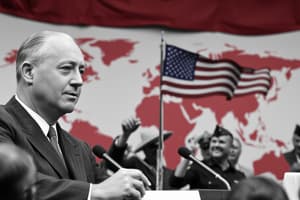Podcast
Questions and Answers
What were the Neutrality Acts?
What were the Neutrality Acts?
Laws passed by Congress to ban the sale of arms or loans to nations at war.
What are the Axis Powers?
What are the Axis Powers?
Germany, Italy, and Japan
What was the Selective Training & Service Act?
What was the Selective Training & Service Act?
First peacetime military draft under which 16 million men between the ages of 21 and 35 were registered.
What did the Lend-Lease Act allow?
What did the Lend-Lease Act allow?
What was the Atlantic Charter?
What was the Atlantic Charter?
Who were the Allies in World War II?
Who were the Allies in World War II?
How did Isolationism affect foreign policy?
How did Isolationism affect foreign policy?
What hint did President Roosevelt give about the possibility of war?
What hint did President Roosevelt give about the possibility of war?
What events moved the United States closer to war?
What events moved the United States closer to war?
What event caused the American declaration of war against Japan?
What event caused the American declaration of war against Japan?
What did the Neutrality Act allow?
What did the Neutrality Act allow?
Who were the Axis Powers?
Who were the Axis Powers?
What did the Lend-Lease Act do?
What did the Lend-Lease Act do?
What actions did the United States take to protest Japan's actions?
What actions did the United States take to protest Japan's actions?
What pledges were contained in the Atlantic Charter?
What pledges were contained in the Atlantic Charter?
What was the impact of the attack on the U.S. Pacific fleet?
What was the impact of the attack on the U.S. Pacific fleet?
Why did Germany and Italy declare war on the United States?
Why did Germany and Italy declare war on the United States?
Flashcards are hidden until you start studying
Study Notes
U.S. Neutrality and Isolationism
- Neutrality Acts banned arms sales and loans to nations at war, reflecting isolationist sentiments in Congress.
- Isolationism influenced U.S. foreign policy decisions, including rejecting assistance plans for China.
Key Powers and Alliances
- Axis Powers: Germany, Italy, and Japan united against the Allies; aimed to keep the U.S. from engaging in war.
- Allies comprised the U.S., Britain, and the Soviet Union, opposing the Axis Powers.
Military Draft and War Preparation
- Selective Training & Service Act introduced America's first peacetime military draft, registering 16 million men aged 21 to 35.
- Lend-Lease Act allowed the U.S. to provide arms and supplies to nations vital for its defense, particularly aiding Britain and the Soviet Union.
Escalating Tensions and Events Leading to War
- Roosevelt warned that peace negotiations with Hitler were futile and emphasized the importance of supporting Britain.
- The U.S. engaged in conflict when a German U-Boat attacked an American destroyer in September 1941, prompting military responses.
Pearl Harbor and U.S. Entry into World War II
- Japan's bombing of Pearl Harbor on December 7, 1941, led to significant American casualties and destruction of naval assets, killing 2,400 people.
- Following the attack, the U.S. declared war on Japan, prompting Germany and Italy to declare war on the United States.
Impacts of Neutrality and Economic Policies
- The Neutrality Act permitted the sale of arms to foreign nations only on a cash-and-carry basis to limit U.S. involvement.
- U.S. trade cuts with Japan, especially oil exports, significantly weakened Japan's military capabilities.
Principles of the Atlantic Charter
- The Atlantic Charter outlined ideals such as collective security, economic cooperation, disarmament, self-determination, and freedom of the seas.
Consequences of War Declarations
- The attack on Pearl Harbor damaged twenty-one ships and sank eight, severely impacting U.S. naval power in the Pacific.
Studying That Suits You
Use AI to generate personalized quizzes and flashcards to suit your learning preferences.




